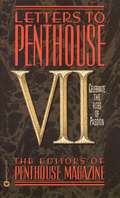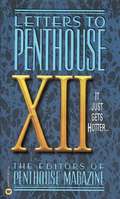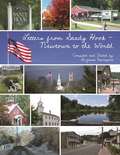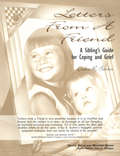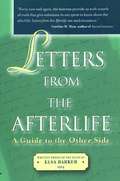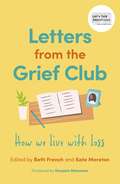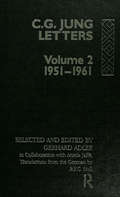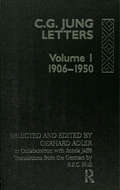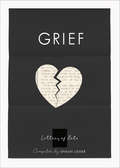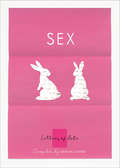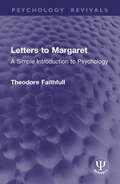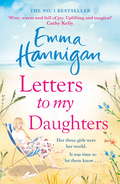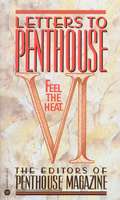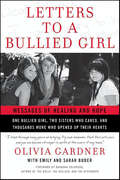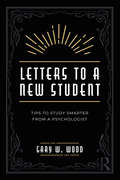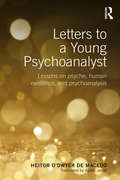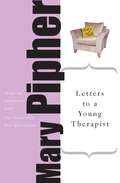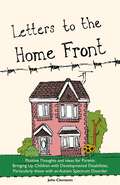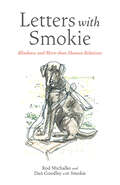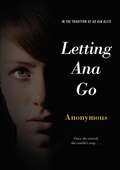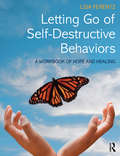- Table View
- List View
Letters To Penthouse VII: Celebrate the Rites of Passion
by The Editors Of Penthouse MagazineThe bestselling "Penthouse Letters" series continues with this book, the latest steamy collection of erotic stories originally featured in "Penthouse" magazine.
Letters To Penthouse XII: It Just Gets Hotter (Penthouse Adventures #12)
by The Editors Of Penthouse MagazineThis collection of erotic stories from the pages of "Penthouse" magazine, sent in by uninhibited readers, reveal everything that goes on behind closed bedroom doors--and other locations.
Letters from Sandy Hook-Newtown to the World
by Suzanne DavenportThe book contains nearly 100 letters, presented in both original handwritten and typed forms. They are further organized into loose grouping that the editor felt were appropriate in the sense that they seemed to echo a common theme or feeling.
Letters from a Friend: A Sibling's Guide to Coping and Grief (Death, Value And Meaning Ser.)
by Erika R. BarberThis unique workbook is a comprehensive compilation of therapeutic activities developed to address the needs and issues of children and adolescents following the death of a brother or sister. The workbook is organized into distinct topic-specific sections relating to sibling hospitalisation, illness, injury, and death. Games, creative writing, and drawing exercises offer opportunities to share feelings and relay experiences in a non-threatening format.. Letters from a Friend may be used by children or teens independently to create a personal journal of their bereavement and coping processes as well as a chronicle of their lives as surviving siblings.
Letters from the Afterlife
by Elsa BarkerDoes life go on beyond the grave? A growing body of evidence suggests that it does. Written through the hand of Elsa Barker, an established author in her own right, Letters from the Light presents a kind of "astral travelogue" that describes--often eloquently, sometimes humorously--life in the "invisible" world.
Letters from the Grief Club: How we live with loss
by Helen Will Tom Leonard Lisa Kim Rebecca Martin Ellen Alison Faith Tim Callen Chloe Rachel Clarke Sasha Steph Karl Knights Saijal Bridget Hamilton Lottie Hawkins Gavin Breen Henry Hodges Anna Kate Blair Adelana Luken Anne Marie Molly Lloyd Kate Dickinson Jermaine Omoregie Phil Hargreaves Tulasi Das Etain Amy Burnside Kylie Noble Jerena Milly Stubbs Kerrie Bridges Eloïse Jessi Parrott Shirin Shah Chanelle Lily Grace Blank Ryan Davies Lucy E. Wakefield Nic Norton Henika Patel Joel Baker Francesca Hopkins Ali Pritchard Abbie Mitchell Fred-Garratt-Stanley Megan Abernethy-Hope Marie-Teresa Hanna EilishWelcome to the club you never wanted to join. When someone you love dies, it may seem impossible to know what will happen next and how you will cope. Losing someone in early adulthood, you may feel even more alone, when no-one around you seems to have had the same experience. Our letters don't have all the answers, but they do have some - because we've been through it ourselves. Some of us have written to ourselves back on that first day of grief, with the reassurance that we will get through those awful first months. Others share snippets from our grief journeys - from the experience of therapy, to the power of getting creative. Encompassing all types of loss, these stories show that there is no one way to grieve. They talk honestly about grief - the sad, the bad, and the surprisingly beautiful. Welcome to the Grief Club, we're so glad you've found us.
Letters of C. G. Jung: Volume 2, 1951-1961
by C.G JungIn May 1956, in his eighty-second year, Jung first discussed with Gerhard Adler the question of the publication of his letters. Over many years, Jung had often used the medium of letters to communicate his ideas to others and to clarify the interpretation of his work, quite apart from answering people who approached him with genuine problems of their own and simply corresponding with friends and colleagues. Many of his letters thus contain new creative ideas and provide a running commentary on his work.From some 1,600 letters written by Jung between the years 1906-1961, the editors have selected over 1,000. Volume 2 contains 460 letters written between 1951 and 1961, during the last years of Jung's life, when he was in contact with many people whose names are familiar to the English reader. These include Mircea Eliade, R.F.C. Hull, Ernest Jones, Herbert Read, J.B. Rhine, Upton Sinclair and Fr. Victor White.Volume 2 also contains an addenda with sixteen letters from the period 1915-1946 and a subject index to both volumes. The annotation throughout is detailed and authoritative.
Letters of C. G. Jung: Volume I, 1906-1950
by C. G. JungIn May 1956, in his eighty-second year, Jung first discussed with Gerhard Adler the question of the publication of his letters. Over many years, Jung had often used the medium of letters to communicate his ideas to others and to clarify the interpretation of his work, quite apart from answering people who approached him with genuine problems of their own and simply corresponding with friends and colleagues. Many of his letters thus contain new creative ideas and provide a running commentary on his work.From some 1,600 letters written by Jung between the years 1906-1961, the editors have selected over 1,000. Volume 1, published in 1973, contains those letters written between 1906 and 1950.
Letters of Note: Grief
by Shaun UsherAn immensely moving collection of letters on the theme of Grief, curated by the founder of the globally popular Letters of Note website.The first volume in the bestselling Letters of Note series was a collection of hundreds of the world's most entertaining, inspiring, and unusual letters, based on the seismically popular website of the same name--an online museum of correspondence visited by over 70 million people. From Virginia Woolf's heartbreaking suicide letter, to Queen Elizabeth II's recipe for drop scones sent to President Eisenhower; from the first recorded use of the expression 'OMG' in a letter to Winston Churchill, to Gandhi's appeal for calm to Hitler; and from Iggy Pop's beautiful letter of advice to a troubled young fan, to Leonardo da Vinci's remarkable job application letter. Now, the curator of Letters of Note, Shaun Usher, gives us wonderful new volumes featuring letters organized around a universal theme. In this volume, Shaun Usher turns to the theme of grief. Contributors to be confirmed.
Letters of Note: Sex (Letters of Note #12)
by Shaun UsherA surprising and varied collection of letters on the subject of sex curated by the founder of the globally popular Letters of Note website. The first volume in the bestselling Letters of Note series was a collection of hundreds of the world's most entertaining, inspiring, and unusual letters, based on the seismically popular website of the same name--an online museum of correspondence visited by over 70 million people. From Virginia Woolf's heartbreaking suicide letter, to Queen Elizabeth II's recipe for drop scones sent to President Eisenhower; from the first recorded use of the expression 'OMG' in a letter to Winston Churchill, to Gandhi's appeal for calm to Hitler; and from Iggy Pop's beautiful letter of advice to a troubled young fan, to Leonardo da Vinci's remarkable job application letter. Now, the curator of Letters of Note, Shaun Usher, gives us wonderful new volumes featuring letters organized around a universal theme. In this volume, Shaun Usher turns to the subject of sex. Includes letters by John Cheever, Dorothy Day, Frida Kahlo, Margaret Mead, Henry Miller, Anaïs Nin, Mae West and many more.
Letters to Judy: What Kids Wish They Could Tell You
by Judy BlumeIn 2,000 letters every month, young people everywhere open their hearts to Judy Blume. Now, in her most special and caring book yet, Judy shares the deepest concerns of kids and often responds with the experiences that affected her own life, both as a child and as a mother. She helps kids feel less alone, and parents less desperate, by discussing topics such as: sibling rivalry and other difficult relationships; divorce, remarriage and step-parents; families that aren't "like everyone else's;" school and friends; changing bodies; crushes, dating and sexuality; drugs and alcohol; secrets that should be told. LETTERS TO JUDY is a love letter addressed to all of us--to anyone who wants to bridge the gaps among family members, to listen, to share, to understand.
Letters to Margaret: A Simple Introduction to Psychology (Psychology Revivals)
by Theodore FaithfullFirst published in 1941, the original blurb for Letters to Margaret reads: ‘In view of the almost universal ignorance of the most elementary biological and psychological facts of life amongst adults, and waste of time and energy amongst children in attempts to acquire surreptitiously the knowledge necessary to them, the author has supplied the need in this book. Drawing upon a fund of material accumulated over twenty years of work for difficult children, he gives in the form of letters to a girl on the threshold of adolescence answers to many questions which puzzle the eager minds of boys and girls. He traces the course of normal growth from birth to the age of twenty-five, and shows how the male and female elements combine to form the human personality. In a small compass he has given parents and teachers a book which will help children reach maturity ready to take an adult part in life. With this volume on their own shelves children will have no need to search the Bible for stray allusions to the act of reproduction, or borrow surreptitiously the volume on “advice to parents” supposedly kept beyond their reach.’ Today it can be read in its historical context.This book is a re-issue originally published in 1941. The language used and views portrayed are a reflection of its era and no offence is meant by the Publishers to any reader by this re-publication.
Letters to My Daughters
by Emma Hannigan** THE NUMBER ONE BESTSELLER **Some books are guaranteed to break your heart - and put it back together again. Letters to my Daughters is one of those wonderful books. Throughout their lives, the three Brady sisters have always been closer to their nanny May than to their own mother, Martha a busy midwife. May always thought of them as her daughters so when she dies suddenly, the sisters are left devastated -- especially when they learn that letters intended for them from May with final words of advice and love have gone missing.But what words of advice could the sisters need?Beatrice, owner of exclusive wedding boutiques, is busy and fulfilled. Rose has a beautiful daughter, a luxurious home and a thriving interiors company. And Jeannie, married to a wealthy plastic surgeon in L.A., wants for nothing. Except that each of the sisters carries a secret ...As they gather for the reading of May's will in Dublin, they must face some life-changing decisions. Will they ever learn the words of advice May had for them and discover who took the letters?Letters to my Daughters is a spellbinding story about the complicated bonds between women -- daughters, mothers, sisters -- and how love and happiness comes in many guises.
Letters to Penthouse VI: Feel The Heat
by The Editors Of Penthouse MagazineIn letters to Penthouse magazine the nation's hottest forum of contemporary sexual issues are covered--or uncovered. Here, as told in their own uninhibited words, is the state of the union between men and women today, in all its inventive, eccentric, energetic variety. The sex is unbelievable and every word is true.
Letters to a Bullied Girl: Messages of Healing and Hope
by Olivia Gardner Sarah Buder Emily BuderOlivia Gardner, a northern California teenager, was severely taunted and cyber-bullied by her classmates for more than two years. News of her bullying spread, eventually reaching two teenage girls from a neighboring town, sisters Emily and Sarah Buder. The girls were so moved by Olivia's story that they initiated a letter-writing campaign to help lift her spirits. It was a tender gesture of solidarity that set off an overwhelming chain reaction of support, encouragement, and love.In Letters to a Bullied Girl, Olivia and the Buder sisters share an inspiring selection of messages that arrived from across America—the personal, often painful remembrances of former targets, remorseful bullies, and sympathetic bystanders. Letters to a Bullied Girl examines our national bullying epidemic from a variety of angles and perspectives, and includes practical guidance from bullying expert Barbara Coloroso, author of The Bully, the Bullied, and the Bystander. Though addressed to Olivia, the letters speak to all young people who have been bullied, offer advice and hope to those who suffer, and provide a wake-up call to all who have ever been involved in bullying.
Letters to a New Student: Tips to Study Smarter from a Psychologist
by Gary WoodLetters to a New Student is a study skills book with a twist. You decide how to read it. Based on a series of short, informal, problem page letters that you can read in any order, the book uses principles of human psychology, teaching, and coaching practice to offer a refreshing approach to study skills and learning techniques. The letters form a brief ‘survive and thrive’ study guide to work smarter not harder and offer advice on topics such as motivation, stress, revision, and assignments. It’s a tried-and-tested, blueprint to make information stick with less effort. The book takes a holistic approach to learning. It covers health and wellbeing, the ‘nuts-and-bolts’ shortcuts, the obstacles, and the pitfalls. It also includes short learning principles and cross-references to other entries, with practical advice in response to the frequently asked questions many students ask during their studies. Letters to a New Student is for any student under pressure, parents and family who want to offer support, or anyone with interest in lifelong learning. It’s written by a psychologist, teacher, academic coach, and advice columnist, with over 20 years professional experience.
Letters to a Young Psychoanalyst: Lessons on Psyche, Human Existence, and Psychoanalysis
by Heitor O'Dwyer de MacedoWritten in the form of letters from an experienced analyst to a young colleague, Letters to a Young Psychoanalyst expands the psychoanalytic frame to include South American, French, and British theory, and examine a wide variety of theoretical and clinical topics. Letters to a Young Psychoanalyst is ground-breaking in more than one respect. It re-examines major psychoanalytic theories in the light of rich clinical practice, and in the light of the practice of friendship, whilst portraying the practice of analysis as the choice of a personal code of ethics. Covering such core issues as transference, trauma, hysteria, the influence of the mother, and love and hate, and drawing on the work of notable analysts such as Winnicott, McDougall, Pankow and Ferenczi, the book explores the many facets of healing function of psychoanalysis in practice and discloses the workings of the psyche in human existence. This book considers psychoanalysis a humanist endeavour, focussing on its healing function and using captivating examples to illustrate different modes of commitment on the part of the analyst. Rejecting a view of psychoanalysis as a painful and laborious process, the book insists instead on the joyous and passionate nature of the work of psychic elaboration. Uniquely, the transmission of knowledge and skill which it provides, constituting a veritable training, is not at all didactic in tone. It places the two interlocutors, as well as the reader, on the same level: people who share the desire to remain attentive to themselves and to others, and who believe that empathy heals, within the setting of therapy and in human relations in general. Written in a remarkably engaging and accessible style, Letters to a Young Psychoanalyst will appeal to psychoanalysts and psychoanalytic psychotherapists, students of all levels studying in these fields, as well as lay readers wishing to understand fundamental psychoanalytic concepts.
Letters to a Young Therapist
by Mary PipherMary Pipher's groundbreaking investigation of America's "girl-poisoning culture,"Reviving Ophelia, has sold nearly two million copies and established its author as one of the nation's foremost authorities on family issues. InLetters to a Young Therapist, Dr. Pipher shares what she has learned in thirty years as a therapist, helping warring families, alienated adolescents, and harried professionals restore peace and beauty to their lives. Letters to a Young Therapistgives voice to her practice with an exhilarating mix of storytelling and sharp-eyed observation. And while her letters are addressed to an imagined young therapist, every one of us can take something away from them. Long before "positive psychology" became a buzzword, Dr. Pipher practiced a refreshingly inventive therapy--fiercely optimistic, free of dogma or psychobabble, and laced with generous warmth and practical common sense. But not until now has this gifted healer described her unique perspective on how therapy can help us revitalize our emotional landscape in an increasingly stressful world. Whether she's recommending daily swims for a sluggish teenager, encouraging a timid husband to become bolder, or simply bearing witness to a bereaved parent's sorrow, Dr. Pipher's compassion and insight shine from every page of this thoughtful and engaging book.
Letters to a Young Therapist
by Mary PipherMary Pipher's groundbreaking investigation of America's "girl-poisoning culture," Reviving Ophelia, has sold nearly two million copies and established its author as one of the nation's foremost authorities on family issues. In Letters to a Young Therapist, Dr. Pipher shares what she has learned in thirty years as a therapist, helping warring families, alienated adolescents, and harried professionals restore peace and beauty to their lives. Letters to a Young Therapist gives voice to her practice with an exhilarating mix of storytelling and sharp-eyed observation. And while her letters are addressed to an imagined young therapist, every one of us can take something away from them. Long before "positive psychology" became a buzzword, Dr. Pipher practiced a refreshingly inventive therapy--fiercely optimistic, free of dogma or psychobabble, and laced with generous warmth and practical common sense. But not until now has this gifted healer described her unique perspective on how therapy can help us revitalize our emotional landscape in an increasingly stressful world. Whether she's recommending daily swims for a sluggish teenager, encouraging a timid husband to become bolder, or simply bearing witness to a bereaved parent's sorrow, Dr. Pipher's compassion and insight shine from every page of this thoughtful and engaging book.
Letters to a Young Therapist
by Mary PipherMary Pipher's groundbreaking investigation of America's "girl-poisoning culture," Reviving Ophelia, has sold nearly two million copies and established its author as one of the nation's foremost authorities on family issues. In Letters to a Young Therapist, Dr. Pipher shares what she has learned in thirty years as a therapist, helping warring families, alienated adolescents, and harried professionals restore peace and beauty to their lives. Letters to a Young Therapist gives voice to her practice with an exhilarating mix of storytelling and sharp-eyed observation. And while her letters are addressed to an imagined young therapist, every one of us can take something away from them. Long before "positive psychology" became a buzzword, Dr. Pipher practiced a refreshingly inventive therapy--fiercely optimistic, free of dogma or psychobabble, and laced with generous warmth and practical common sense. But not until now has this gifted healer described her unique perspective on how therapy can help us revitalize our emotional landscape in an increasingly stressful world. Whether she's recommending daily swims for a sluggish teenager, encouraging a timid husband to become bolder, or simply bearing witness to a bereaved parent's sorrow, Dr. Pipher's compassion and insight shine from every page of this thoughtful and engaging book.
Letters to a Young Therapist
by Mary PipherMary Pipher's groundbreaking investigation of America's "girl-poisoning culture," Reviving Ophelia, has sold nearly two million copies and established its author as one of the nation's foremost authorities on family issues. In Letters to a Young Therapist, Dr. Pipher shares what she has learned in thirty years as a therapist, helping warring families, alienated adolescents, and harried professionals restore peace and beauty to their lives. Letters to a Young Therapist gives voice to her practice with an exhilarating mix of storytelling and sharp-eyed observation. And while her letters are addressed to an imagined young therapist, every one of us can take something away from them. Long before "positive psychology" became a buzzword, Dr. Pipher practiced a refreshingly inventive therapy--fiercely optimistic, free of dogma or psychobabble, and laced with generous warmth and practical common sense. But not until now has this gifted healer described her unique perspective on how therapy can help us revitalize our emotional landscape in an increasingly stressful world. Whether she's recommending daily swims for a sluggish teenager, encouraging a timid husband to become bolder, or simply bearing witness to a bereaved parent's sorrow, Dr. Pipher's compassion and insight shine from every page of this thoughtful and engaging book.
Letters to the Home Front: Positive Thoughts and Ideas for Parents Bringing Up Children with Developmental Disabilities, Particularly those with an Autism Spectrum Disorder
by John ClementsBringing up a child with developmental disabilities, especially autism, presents many challenges for parents, and the focus of attention is almost invariably on the child. This practical and compassionate book looks at a range of issues from the parents' point of view - from whether their child really loves them, to challenging received wisdom on matters such as sensory integration and boarding school. The author's many decades of experience of working with families provide the basis for this practical support and help in thinking about and approaching some of the most difficult and intractable issues. One, often unvoiced, concern for parents is whether their children love or care about them. The first section of the book consists of three letters from young people to their parents, showing clearly that though they may never have been able to say so directly, they do love and appreciate their parents, and what they have done for them - a strong message for all parents in a similar situation. Clements goes on to look at how the parenting agenda changes over time, how to see beyond the diagnoses and the constant need to deal with immediate problems, to see the real people who make up the family, the impact on siblings, how to manage the system and the multiple professional agencies over long periods of time, and how to think about the offer of medication to control behaviour. An important section addresses some of the most distressing behavioural challenges: physical aggression, verbal abuse, long-term severe self-injury, property damage, and obsessions. Finally, Clements offers objective and open-minded reflections on received wisdom about two other unchallenged topics - sensory integration, and the usefulness or otherwise of boarding schools. The book is practical, compassionate, and above all, useful. It will be of ongoing use to parents, and equally useful to professionals working with families encountering the issues covered.
Letters with Smokie: Blindness and More-than-Human Relations
by Rod Michalko Dan GoodleyLeave it to a dog to put the “human” back in “humanities” In September 2020, Rod Michalko wrote to friend and colleague Dan Goodley, congratulating him on the release of his latest book, Disability and Other Human Questions. Joking that his late guide dog, Smokie, had taken offense to the suggestion that disability was purely a human question, Michalko shared a few thoughts on behalf of his dog. When Goodley wrote back—to Smokie—so began an epistolic exchange that would continue for the next seven months. As the COVID-19 pandemic swept across the world and the realities of lockdown-imposed isolation set in, the Smokie letters provided the friends a space in which to come together in a lively exploration of human-animal relationships and to interrogate disability as disruption, disturbance, and art. Just as he did in life, Smokie guides. In these pages, he offers wisdom about the world, love, friendship, and even The Beatles. His canine observations of human experience provide an avenue into some of the ways blindness might be reconceptualized and “befriended.” Uninhibited by the trappings of traditional academic inquiry, Michalko and Goodley are unleashed, free to wander, to wonder, and to provoke within the bonds of trust and respect. Funny and thoughtful, the result is a refreshing exploration and re-evaluation of learned cultural misunderstandings of disability.
Letting Ana Go: Lucy In The Sky; Letting Ana Go; Calling Maggie May; Breaking Rachel (Anonymous Diaries)
by AnonymousIn the tradition of Go Ask Alice and Lucy in the Sky, a harrowing account of anorexia and addiction.She was a good girl from a good family, with everything she could want or need. But below the surface, she felt like she could never be good enough. Like she could never live up to the expectations that surrounded her. Like she couldn't do anything to make a change. But there was one thing she could control completely: how much she ate. The less she ate, the better--stronger--she felt. But it's a dangerous game, and there is such a thing as going too far... Her innermost thoughts and feelings are chronicled in the diary she left behind.
Letting Go of Self-Destructive Behaviors: A Workbook of Hope and Healing
by Lisa FerentzLetting Go of Self-Destructive Behaviors offers inspiring, hopeful, creative resources for the millions of male and female adolescents and adults who struggle with eating disorders, addictions, any form of self-mutilation. It is also a workbook for the clinicians who treat them. Using journaling exercises, drawing and collaging prompts, guided imagery, visualizations, and other behavioral techniques, readers will learn how to understand, compassionately work with, and heal from their behaviors rather than distracting from or fighting against them, which can dramatically reduce internal conflict and instill genuine hope. Techniques are provided in easy-to-follow exercises that focus on calming the body, containing overwhelming emotions, managing negative and distorted thoughts, re-grounding from flashbacks, addressing tension and anxiety, decreasing a sense of vulnerability, strengthening assertiveness and communication skills, and accessing inner wisdom. This workbook can be used in conjunction with Treating Self-Destructive Behaviors in Trauma Survivors, 2nd ed, also by Lisa Ferentz, to allow therapists and their clients to approach the behaviors from the same strengths-based perspective. Workbook exercises can be completed as homework assignments or as part of a therapy session. In either case, the client is given the opportunity to process their work and share their insights with a compassionate witness and trained professional, making the healing journey even safer and more rewarding.
